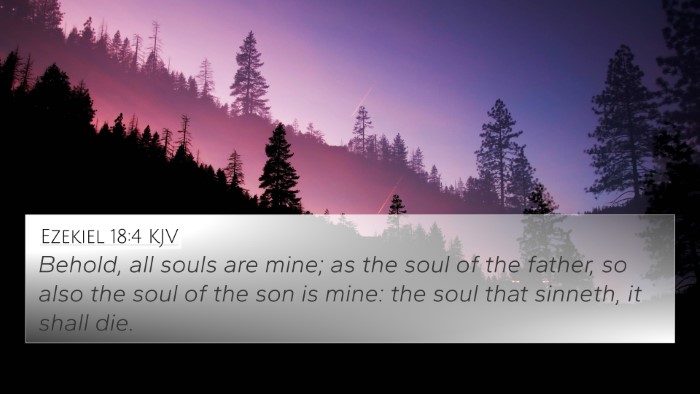Old Testament
Genesis Exodus Leviticus Numbers Deuteronomy Joshua Judges Ruth 1 Samuel 2 Samuel 1 Kings 2 Kings 1 Chronicles 2 Chronicles Ezra Nehemiah Esther Job Psalms Proverbs Ecclesiastes Song of Solomon Isaiah Jeremiah Lamentations Ezekiel Daniel Hosea Joel Amos Obadiah Jonah Micah Nahum Habakkuk Zephaniah Haggai Zechariah MalachiJob 19:4 Similar Verses
Job 19:4 Cross References
And be it indeed that I have erred, mine error remaineth with myself.
Uncover the Rich Themes and Topics of This Bible Verse
Listed below are the Bible themes associated with Job 19:4. We invite you to explore each theme to gain deeper insights into the Scriptures.
Job 19:4 Cross Reference Verses
This section features a detailed cross-reference designed to enrich your understanding of the Scriptures. Below, you will find carefully selected verses that echo the themes and teachings related to Job 19:4 KJV. Click on any image to explore detailed analyses of related Bible verses and uncover deeper theological insights.

Proverbs 9:12 (KJV) »
If thou be wise, thou shalt be wise for thyself: but if thou scornest, thou alone shalt bear it.

2 Samuel 24:17 (KJV) »
And David spake unto the LORD when he saw the angel that smote the people, and said, Lo, I have sinned, and I have done wickedly: but these sheep, what have they done? let thine hand, I pray thee, be against me, and against my father's house.

Job 11:3 (KJV) »
Should thy lies make men hold their peace? and when thou mockest, shall no man make thee ashamed?

Ezekiel 18:4 (KJV) »
Behold, all souls are mine; as the soul of the father, so also the soul of the son is mine: the soul that sinneth, it shall die.

2 Corinthians 5:10 (KJV) »
For we must all appear before the judgment seat of Christ; that every one may receive the things done in his body, according to that he hath done, whether it be good or bad.
Job 19:4 Verse Analysis and Similar Verses
Understanding Job 19:4
Job 19:4 states: “And even if I have indeed spoken, my error remains with myself.” This verse captures Job's anguish and the depths of his suffering amidst the dialogue with his friends.
Summary of Interpretation
This verse reflects Job's acknowledgment of his plight while also hinting at the isolation and abandonment he feels. Job’s suffering is profound as he grapples with the seeming absence of justice in his life. This verse serves as a poignant expression of his struggle for understanding in the face of suffering.
Commentary Insights
- Matthew Henry highlights Job's articulation of his inner turmoil and emphasizes the loneliness in suffering. Henry notes that Job is aware of his mistakes but feels they are overshadowed by his current agony.
- Albert Barnes offers insights into the implications of Job's statement, suggesting that the acknowledgment of personal error does not negate the overwhelming nature of his suffering. He emphasizes the importance of context in understanding Job’s struggle.
- Adam Clarke expands on the theological implications, indicating that Job's lamentation reflects a deeper inquiry into the nature of God’s justice. Clarke posits that Job's declaration is a key moment for readers to understand the dynamics of faith amidst suffering.
Cross-Referencing Biblical Texts
Job 19:4 can be cross-referenced with several significant scriptures that relate to themes of suffering, justice, and human emotion. Here are 10 key Bible verse cross-references:
- Job 1:21 - As Job expresses his loss, he states that he came into the world with nothing and will leave with nothing, underscoring acceptance in the face of despair.
- Psalm 39:4-5 - The psalmist reflects on the brevity of human life and the weight of our transgressions, mirroring Job's contemplations.
- Romans 3:23 - This verse encapsulates the universal nature of sin, resonating with Job's acknowledgment of his errors.
- 2 Corinthians 12:9 - Paul’s declaration that God’s grace is sufficient in our weaknesses can be seen as a response to Job’s feelings of inadequacy.
- James 1:2-4 - This passage about finding joy in trials connects with Job's perseverance amidst suffering.
- 1 Peter 5:10 - The promise of restoration after suffering aligns with Job's quest for resolution and understanding.
- Isaiah 53:3 - The suffering servant, acquainted with grief, serves as a parallel to Job’s experience.
- Psalm 22:1 - Both Job and the psalmist express feelings of abandonment, highlighting a deeper theological reflection on suffering.
- Lamentations 3:19-23 - The author’s lamentation brings to mind Job’s own cries for mercy and justice.
- Hebrews 12:1-2 - Encouragement to persevere through suffering encourages parallels with Job's steadfastness in faith.
Thematic Bible Verse Connections
Job 19:4 serves as a crucial point for thematic exploration, particularly in the context of suffering and divine justice. The inter-Biblical dialogue surrounding this verse provides valuable insights into understanding how other scriptures interact.
Exploring Connections between Bible Verses
The connections between Bible verses become clearer through comparative Bible verse analysis. When studying Job's experience alongside passages about suffering and redemption, a more comprehensive understanding emerges.
Conclusion
In conclusion, Job 19:4 captures profound existential struggles that resonate throughout Scripture. Through examining cross-references and thematic connections, we gain deeper insights into the meaning of suffering, human frailty, and the quest for divine justice.



